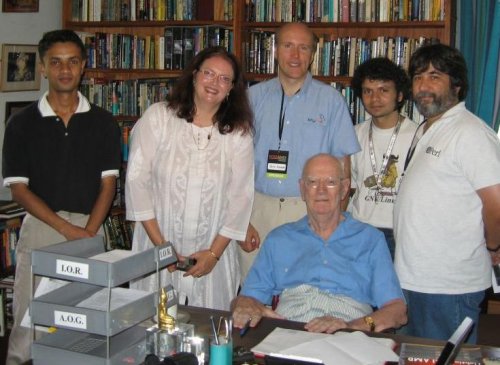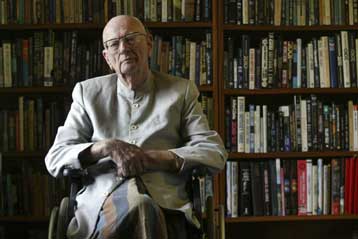Biography
 The achievements of Arthur C. Clarke, unique among his peers, bridge the arts and sciences. His works and his authorship have ranged from scientific discovery to science fiction, from technical application to entertainment, and have made a global impact on the lives of present and future generations.
The achievements of Arthur C. Clarke, unique among his peers, bridge the arts and sciences. His works and his authorship have ranged from scientific discovery to science fiction, from technical application to entertainment, and have made a global impact on the lives of present and future generations.
Arthur C. Clarke is the son of an English farming family, born in the seaside town of Minehead, Somerset, England on December 16, 1917. In 1998, his lifetime work was recognized by H.M. The Queen when he was honored with a Knighthood – formally conferred by Prince Charles in Sri Lanka two years later.
After attending schools in his home county, Arthur Clarke moved to London in 1936 and pursued his early interest in space sciences by joining the British Interplanetary Society. He started to contribute to the BIS Bulletin and began to write science fiction.
As with so many young men at the time, World War II interrupted in 1939 and he joined the RAF, eventually becoming an officer in charge of the first radar talk-down equipment, the Ground Controlled Approach, during its experimental trials. Later, his only non-science-fiction novel, Glide Path, was based on this work. After the war, he returned to London and to the BIS, becoming its president in 1947-50 and again in 1953.
In 1945, a UK periodical magazine “Wireless World” published his landmark technical paper "Extra-terrestrial Relays" in which he first set out the principles of satellite communication with satellites in geostationary orbits - a speculation realized 25 years later. During the evolution of his discovery, he worked with scientists and engineers in the USA in the development of spacecraft and launch systems, and addressed the United Nations during their deliberations on the Peaceful Uses of Outer Space.
Clarke's work, which led to the global satellite systems in use today, brought him numerous honors including the 1982 Marconi International Fellowship, a gold medal of the Franklin Institute, the Vikram Sarabhai Professorship of the Physical Research Laboratory, Ahmedabad, the Lindbergh Award and a Fellowship of King's College, London. Today, the geostationary orbit at 36,000 kilometers above the equator is named The Clarke Orbit by the International Astronomical Union.
After leaving the RAF in 1946, he resumed his formal studies and was awarded a Fellowship at King's College, London where he obtained first class honors in Physics and Mathematics in 1948.
In 1954, Clarke wrote to Dr. Harry Wexler, then chief of the Scientific Services Division, U.S. Weather Bureau, about satellite applications for weather forecasting. From these communications, a new branch of meteorology was born, and Dr. Wexler became the driving force in using rockets and satellites for meteorological research and operations.
At the same time, Clarke has been the author of many books, articles and papers. The first story he sold professionally was "Rescue Party", written in March 1945 and appearing in Astounding Science in May 1946. He went on to become a prolific writer of science fiction, renowned worldwide and with more than 70 titles to his name. Among his many non-fiction works, “Profiles of the Future” (1962) looked at the probable shape of tomorrow's world and stated his “Three Laws”.
In 1964, he started to work with the noted film producer Stanley Kubrick on a science fiction movie script. Four years later, he shared an Oscar nomination with Kubrick at the Hollywood Academy Awards for the film version of “2001: A Space Odyssey”. Then, in 1985, he published a sequel, “2010: Odyssey Two” and worked with Peter Hyams on the movie version. Their work was done using a Kaypro computer and a modem, linking Arthur in Sri Lanka and Peter Hyams in Los Angeles, leading to a book “The Odyssey File - The Making of 2010.”
In television, Clarke worked alongside Walter Cronkite and Wally Schirra for the CBS coverage of the Apollo 12 and 15 space missions. His thirteen-part TV series Arthur C. Clarke's Mysterious World in 1981 and Arthur C. Clarke's World of strange Powers in 1984 has been screened in many countries and he has contributed to other TV series about space, such as Walter Cronkite's Universe series in 1981.
Clarke first visited Colombo, Sri Lanka (then called Ceylon) in December 1954 and has lived there since 1956 pursuing an enthusiasm for underwater exploration along that coast and on the Great Barrier Reef. In recent years, he has been largely confined to a wheelchair due to post-polio syndrome, but his output as a writer has continued undiminished.
NOTE: the authorized biography by Neil McAleer - Arthur C. Clarke - The Authorized Biography - was published by Contemporary Books, Chicago, in 1992.

Hey, it's Sir Arthur C Clarke's 90th birthday on December 16th, and the Sri Lanka Astronomical Association is collecting birthday wishes from Sir A's many fans, admirers and friends. Thilina sez,
Today, the Clarke Orbit has over 330 satellites. Sir Arthur C. Clarke, a science-fiction author, inventor, and futurist, simply a greate mind celebrates his 90th birth anniversary on 16th of December, 2007.In 1959, he founded the Ceylon Astronomical Association (now known as Sri Lanka Astronomical Association). As the current General Secretary of the Association, I'm honored to run an association founded by him. And as a big fan of his writings and admirer of his work, I have put up a blog where every one could wish him for his 90th birth day.
If you are a friend, colleague, fan or simply an earthling who admires work of Sir Arthur Clarke, please write your greetings and good wishes on the blog.

No comments:
Post a Comment